八年级英语下册语法、时态新目标预习复习资料人教新目标版
人教版新目标八年级下册-英语语法知识点精讲练习
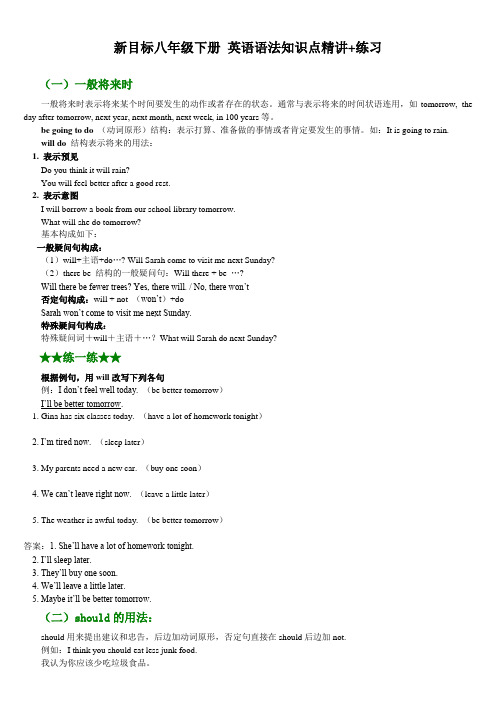
新目标八年级下册英语语法知识点精讲+练习(一)一般将来时一般将来时表示将来某个时间要发生的动作或者存在的状态。
通常与表示将来的时间状语连用,如tomorrow, the day after tomorrow, next year, next month, next week, in 100 years等。
be going to do(动词原形)结构:表示打算、准备做的事情或者肯定要发生的事情。
如:It is going to rain.will do结构表示将来的用法:1. 表示预见Do you think it will rain?You will feel better after a good rest.2. 表示意图I will borrow a book from our school library tomorrow.What will she do tomorrow?基本构成如下:一般疑问句构成:(1)will+主语+do…? Will Sarah come to visit me next Sunday?(2)there be 结构的一般疑问句:Will there + be …?Will there be fewer trees? Yes, there will. / No, there won’t否定句构成:will + not (won’t)+doSarah won’t come to visit me next Sunday.特殊疑问句构成:特殊疑问词+will+主语+…?What will Sarah do next Sunday?★★练一练★★根据例句,用will改写下列各句例:I don’t feel well today. (be better tomorrow)I’ll be better tomorrow.1. Gina has six classes today. (have a lot of homework tonight)_____________________________2. I’m tired now. (sleep later)_____________________________3. My parents need a new car. (buy one soon)_____________________________4. We can’t leave right now. (leave a little later)_____________________________5. The weather is awful today. (be better tomorrow)_____________________________答案:1. She’ll have a lot of homework tonight.2. I’ll sleep later.3. They’ll buy one soon.4. We’ll leave a little later.5. Maybe it’ll be better tomorrow.(二)should的用法:should用来提出建议和忠告,后边加动词原形,否定句直接在should后边加not.例如:I think you should eat less junk food.我认为你应该少吃垃圾食品。
最新人教版新目标八年级下册-英语语法知识点精讲+练习

2016年八年级下册英语语法知识点(一)一般将来时一般将来时表示将来某个时间要发生的动作或者存在的状态。
通常与表示将来的时间状语连用,如tomorrow, the day after tomorrow, next year, next month, next week, in 100 years等。
be going to do (动词原形)结构:表示打算、准备做的事情或者肯定要发生的事情。
如:It is going to rain.will do 结构表示将来的用法:1. 表示预见Do you think it will rain?You will feel better after a good rest.2. 表示意图I will borrow a book from our school library tomorrow.What will she do tomorrow?基本构成如下:一般疑问句构成:(1)will+主语+do…? Will Sarah come to visit me next Sunday?(2)there be 结构的一般疑问句:Will there + be …?Will there be fewer trees? Yes, there will. / No, there won’t否定句构成:will + not (won’t)+doSarah won’t come to visit me next Sunday.特殊疑问句构成:特殊疑问词+will+主语+…?What will Sarah do next Sunday?(二)should的用法:should用来提出建议和忠告,后边加动词原形,否定句直接在should后边加not.例如:I think you should eat less junk food.我认为你应该少吃垃圾食品。
She drives a lot and she seldom walks. So I think she should walk a lot.她经常开车,很少走路。
人教新目标八年级下各单元知识点整理

人教新目标八年级下期末复习知识点整理Unit 1 Will people have robots?1.形容词,副词的比较等级考查热点透视:a) 表示A与B在程度上相同时,“as+形容词或副词的原级+as”结构。
表示A不如B时,可用“not as/so+形容词或副词的原级+as”结构。
b) 表示A比B在程度上“更…..”时,可用“形容词或副词的比较级+than”结构c) 表示三者或三者以上的比较,其中一个在程度上“最…..”时,常用“the+形容词或副词的最高级”结构,后面可带“of/in的短语”来说明比较的范围。
(注意:副词的最高级在句中常省略“the”.)d) 在形容词或副词的比较级前,可以用“a little, even, far, much,still”的等词语来修饰,以加强语气。
e) 表示“越来越….”时,常用“形容词或副词的比较级+and+形容词或副词的比较级”结构,但要注意,对于多音节和部分双音节形容词,副词而言,若要表达此意时,要用“more and more+形容词或副词的原级“结构。
f) 在表示“其中最….之一“的含义时,常使用“one of+the+形容词最高级形式+名词复数”结构,其中的定冠词the不可以省略。
g) 如果强调“两者中比较…的(一个)”的意思时,可使用“the+形容词比较级+其它”结构。
h) 表示“越….越….”, 可使用“the+形容词或副词的比较级,the+形容词或副词的比较级”结构。
2 .一般将来时a) 一般将来时的构成:由助动词shall或will加动词原形构成,shall用于第一人称。
在口语中,will在名词或代词后常简略为’ll,will not常简略为won’t。
这个时态的肯定,否定和疑问结构可表示如下:用”be going to +动词原形”也可表示将来时,表示将要发生的事,打算或决定要做的事。
b)一般将来时的用法:1)表示将要发生的动作或情况;2)不以人的意志为转移,肯定要发生的事情。
人教版新目标八年级下册英语期末复习(语法)
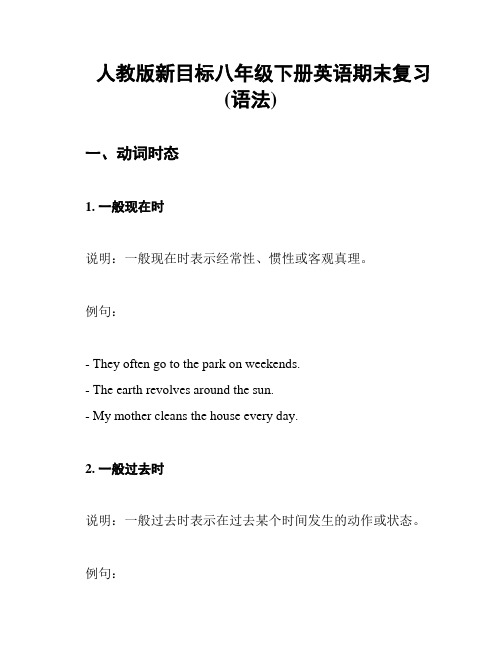
人教版新目标八年级下册英语期末复习(语法)一、动词时态1. 一般现在时说明:一般现在时表示经常性、惯性或客观真理。
例句:- They often go to the park on weekends.- The earth revolves around the sun.- My mother cleans the house every day.2. 一般过去时说明:一般过去时表示在过去某个时间发生的动作或状态。
例句:- I visited my grandparents last summer.- She lived in London when she was young.- They played basketball yesterday.3. 现在进行时说明:现在进行时表示此时此刻正在进行的动作。
例句:- We are studying for the exam right now.- Look! Mary is dancing in the classroom.- They are having dinner at the restaurant.4. 一般将来时说明:一般将来时表示将来某个时间将要发生的动作。
例句:- We will go to the beach next weekend.- She is going to travel to Europe next month.- They will have a party for their anniversary.5. 现在完成时说明:现在完成时表示过去发生的动作对现在有影响或结果。
例句:- I have finished my homework.- Have you ever been to China?- They have lived in this city for five years.二、被动语态被动语态由助动词"be"和动词的过去分词构成。
新目标英语八年级下Unit1—5单元语法考点梳理及精练

总复习Unit 1-5一.Grammar Focus(语法专项复习)一般将来时定义:表示将要发生的动作或存在的状态,目前还没有发生。
结构:1. will/shall(将,会,要)+ 动词原形(will可用于任何人称,shall只能用于第一人称I/W e)I/Y ou/He/She/They/We will have robots at home in 200 years.I/We shall dress more casually.2. be going to +动词原形(发生的可能性较大)①.表示主观打算计划要做某事。
I’m going to sell my old house②.表示说话者根据客观现象推断某事是否会发生。
Look at the clouds! It’s going to rain.3. 现在进行时结构(be + 动词ing)表示将来时(表示按计划、安排即将发生的动作,常用于位置转移的动词。
如:go, come, leave, arrive等)Wait a minute. I’m coming.时间状语:next time/ week/month/year, tomorrow, tomorrow evening, the day after tomorrow(后天), this afternoon/evening, tonight, before long(不久), in the future, in+时间(in ten minutes),soon(很快), later(on)(以后)特殊句型:There be 句型1. 表示“某处(某时)有某人(物)”There are fourteen books in her schoolbag.There was a boy at that time.2.遵循“就近原则”There is a pen and two pencils on the desk.There are two boys and a teacher in the room.3.There be句型的将来时:there will be/there is going to be(后者可能性大于前者)There will be more cars in our city in the future.There is going to be a football game tomorrow.小练:1). 翻译There ________(将有)a movie this evening. People ______(将有)robots in their homes. People ________(将活)to be 200 years old. People______(将用)the subways less. Kids _______ (将学习)at home on computers. Kids _________(将不去)to school to study.2). 把上面句子变成一般疑问句(并作肯定和否定回答)和否定句3). There________some yogurt and two tamatoes on the table.(be)4). There________ three children and a teacher in the classroom.(be)5). There________ a beautiful flower and two hats on the floor last night.(be)6). ________ an English party in our school this evening.A. There will beB. There is going to beC. There will haveD. There is going to have过去进行时定义:表示过去某一时刻或某一段时间一直在进行的动作。
人教版新目标八年级下册英语各单元短语句型语法复习提纲(全面!)
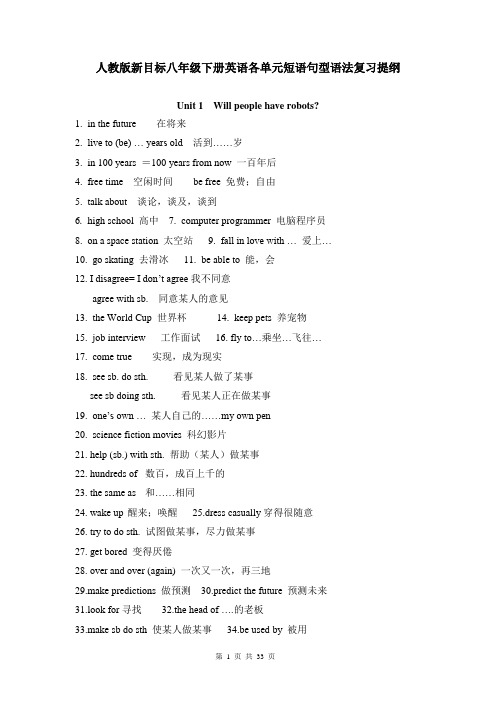
人教版新目标八年级下册英语各单元短语句型语法复习提纲Unit 1 Will people have robots?1. in the future 在将来2. live to (be) … years old 活到……岁3. in 100 years =100 years from now 一百年后4. free time 空闲时间be free 免费;自由5.talk about 谈论,谈及,谈到6. high school 高中7. computer programmer 电脑程序员8. on a space station 太空站9. fall in love with … 爱上…10. go skating 去滑冰11. be able to 能,会12. I disagree= I don’t agree我不同意agree with sb. 同意某人的意见13. the World Cup 世界杯14. keep pets 养宠物15. job interview 工作面试16. fly to…乘坐…飞往…17. come true 实现,成为现实18. see sb. do sth. 看见某人做了某事see sb doing sth. 看见某人正在做某事19. one’s own … 某人自己的……my own pen20. science fiction movies 科幻影片21. help (sb.) with sth. 帮助(某人)做某事22. hundreds of 数百,成百上千的23. the same as 和……相同24. wake up 醒来;唤醒25.dress casually穿得很随意26. try to do sth. 试图做某事,尽力做某事27. get bored 变得厌倦28. over and over (again) 一次又一次,再三地29.make predictions 做预测30.predict the future 预测未来31.look for寻找32.the head of ….的老板33.make sb do sth 使某人做某事34.be used by 被用35.less pollution 更少的污染36. live alone 单独居住37.be in different shapes形状不同38.as a reporter 作为记者39.some...others... 一些……另一些……40.live in an apartment 住在公寓本单元目标句型:1. What do you think life will be like in 100 years?2. There will be fewer trees、more buildings and less pollution in the future.few(修饰可数名词);less(修饰不可数名词)表示几乎没有,有否定之意,;more二者都可以修饰。
新目标人教版初中英语八年级下册课文复习全套资料
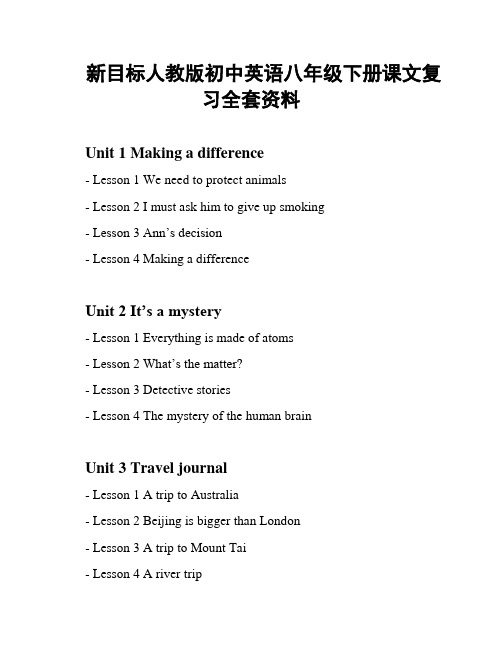
新目标人教版初中英语八年级下册课文复习全套资料Unit 1 Making a difference- Lesson 1 We need to protect animals- Lesson 2 I must ask him to give up smoking- Lesson 3 Ann’s decision- Lesson 4 Making a differenceUnit 2 It’s a mystery- Lesson 1 Everything is made of atoms- Lesson 2 What’s the matter?- Lesson 3 Detective stories- Lesson 4 The mystery of the human brainUnit 3 Travel journal- Lesson 1 A trip to Australia- Lesson 2 Beijing is bigger than London- Lesson 3 A trip to Mount Tai- Lesson 4 A river tripUnit 4 Music- Lesson 1 Sounds of music- Lesson 2 We’re trying to find a boy band- Lesson 3 A famous orchestra- Lesson 4 Music in our heartsUnit 5 Amazing stories- Lesson 1 A greener future- Lesson 2 I used to be afraid of the dark- Lesson 3 Pygmalion- Lesson 4 Amazing sports storiesUnit 6 Films and TV programmes- Lesson 1 TV programmes- Lesson 2 What’s on?- Lesson 3 Jurassic Park- Lesson 4 Harry Potter and the Philosopher's StoneUnit 7 Teenagers should be allowed to choose their own clothes- Lesson 1 Children should be allowed to grow up freely- Lesson 2 Uniforms or casual clothes?- Lesson 3 Different styles- Lesson 4 Fashion and societyUnit 8 Helping others- Lesson 1 Offering help- Lesson 2 First aid- Lesson 3 Volunteers- Lesson 4 A charity show这份全套资料包含了新目标人教版初中英语八年级下册的每个单元以及它们各自包含的四节课。
人教新目标八年级英语下册全书大归纳

10.What do you think of ...?你认为...怎么样? What do you think of the book?你认为这本书怎么样? 11.It is+adj.(for /of sb.)+to dosth./It is+adj.+that从句. It is important for us to learn English well. 对我们来说,学好英语很重要。 It's clever of you to work out the math problem. 你真聪明,解出了这道数学题。 12.not...until...直到...才... He didn't go to bed until he finished the work. 他直到完成工作才上床睡觉。 13.one of the+形容词最高级+复数名词 最...之一 English is one of the most useful languages in the world. 英语是世界上最有用的语言之一。
二.常考英语短语和句型 1.would like to do sth.想要做某事 I would like to go to an inexpensive restaurant. 我想去一家花费少的餐馆。 2.Could you please ...?请你.....好吗? Could you please open the the window ? 请你打开窗户好吗? 3.have problems (in) doing sth.做某事有困难 He had problems (in)researching the top of the mountain. 他到达山顶有困难。 ed to do sth.过去常常做某事 I used to get up early.我过去常常起床很早。 5.decide to do sth.决定做某事 I decided to go somewhere quiet. 我决定去某个安静的地方。
人教新目标 八年级英语下册 知识点归纳 人教新目标版
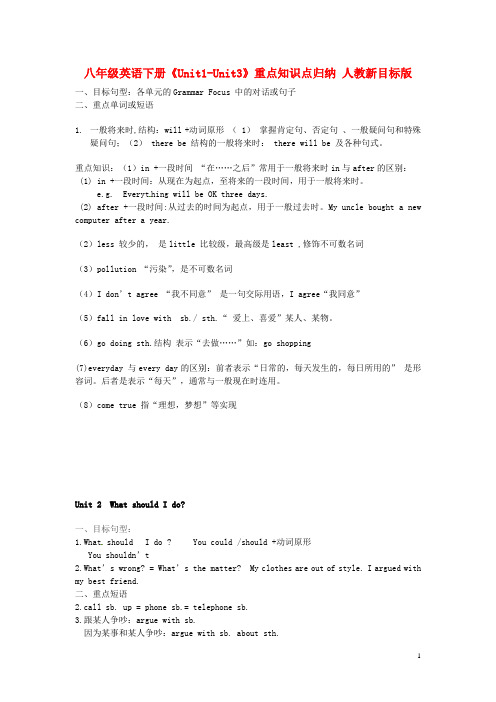
八年级英语下册《Unit1-Unit3》重点知识点归纳人教新目标版一、目标句型:各单元的Grammar Focus 中的对话或句子二、重点单词或短语1.一般将来时,结构:will +动词原形( 1)掌握肯定句、否定句、一般疑问句和特殊疑问句;(2) there be 结构的一般将来时: there will be 及各种句式。
重点知识:(1)in +一段时间“在……之后”常用于一般将来时in与after的区别:(1) in +一段时间:从现在为起点,至将来的一段时间,用于一般将来时。
e.g. Everyt hing will be OK three days.(2) after +一段时间:从过去的时间为起点,用于一般过去时。
My uncle bought a new computer after a year.(2)less 较少的,是little 比较级,最高级是least ,修饰不可数名词(3)pollution “污染”,是不可数名词(4)I don’t agree “我不同意”是一句交际用语,I agree“我同意”(5)fall in love with sb./ sth.“爱上、喜爱”某人、某物。
(6)go doing sth.结构表示“去做……”如:go shopping(7)everyday 与every day的区别:前者表示“日常的,每天发生的,每日所用的”是形容词。
后者是表示“每天”,通常与一般现在时连用。
(8)come true 指“理想,梦想”等实现Unit 2 What should I do?一、目标句型:1.What should I do ? You could /should +动词原形You shouldn’t2.What’s wrong? = What’s the matter? My clothes are out of style. I argued with my best friend.二、重点短语2.call sb. up = phone sb.= telephone sb.3.跟某人争吵:argue with sb.因为某事和某人争吵:argue with sb. about sth.5.either、too与also的区别:(1)either:位于句末,用于否定句。
(完整版)人教版新目标英语八年级下册知识点全归纳.doc
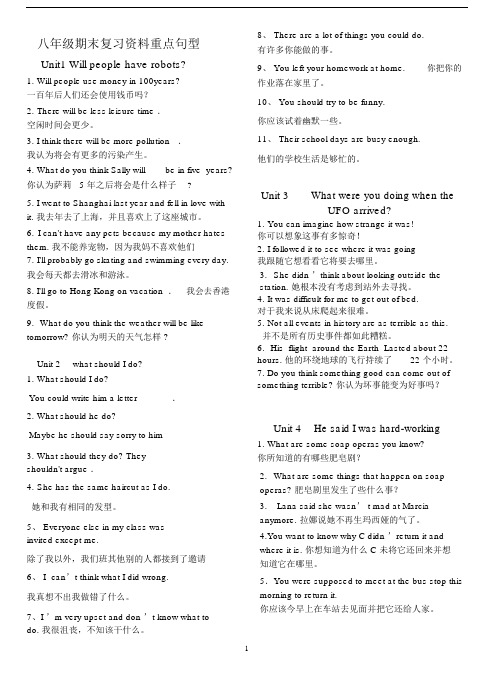
八年级期末复习资料重点句型Unit1 Will people have robots?1. Will people use money in 100years?一百年后人们还会使用钱币吗?2.There will be less leisure time .空闲时间会更少。
3. I think there will be more pollution.我认为将会有更多的污染产生。
4. What do you think Sally will be in five years? 你认为萨莉 5 年之后将会是什么样子?5.I went to Shanghai last year and fell in love with it. 我去年去了上海,并且喜欢上了这座城市。
6.I can't have any pets because my mother hates them. 我不能养宠物,因为我妈不喜欢他们7.I'll probably go skating and swimming every day. 我会每天都去滑冰和游泳。
8. I'll go to Hong Kong on vacation .我会去香港度假。
9.What do you think the weather will be like tomorrow? 你认为明天的天气怎样 ?Unit 2 what should I do?1. What should I do?You could write him a letter.2. What should he do?Maybe he should say sorry to him3.What should they do? Theyshouldn't argue .4.She has the same haircut as I do.她和我有相同的发型。
初中英语人教新目标八年级下册Unit4Grammar预习指导(知识点+练习题)
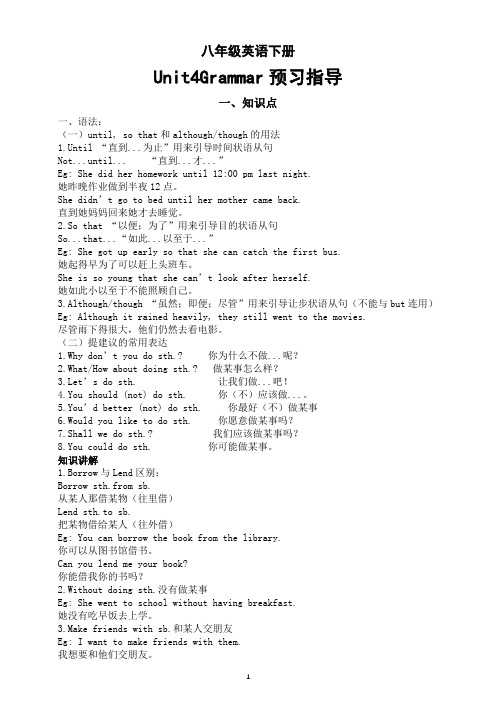
八年级英语下册Unit4Grammar预习指导一、知识点一、语法:(一)until, so that和although/though的用法1.Until “直到...为止”用来引导时间状语从句Not...until... “直到...才...”Eg: She did her homework until 12:00 pm last night.她昨晚作业做到半夜12点。
She didn’t go to bed until her mother came back.直到她妈妈回来她才去睡觉。
2.So that “以便;为了”用来引导目的状语从句So...that...“如此...以至于...”Eg: She got up early so that she can catch the first bus.她起得早为了可以赶上头班车。
She is so young that she can’t look after herself.她如此小以至于不能照顾自己。
3.Although/though “虽然;即便;尽管”用来引导让步状语从句(不能与but连用)Eg: Although it rained heavily, they still went to the movies.尽管雨下得很大,他们仍然去看电影。
(二)提建议的常用表达1.Why don’t you do sth.? 你为什么不做...呢?2.What/How about doing sth.? 做某事怎么样?3.Let’s do sth. 让我们做...吧!4.You should (not) do sth. 你(不)应该做...。
5.You’d better (not) do sth. 你最好(不)做某事6.Would you like to do sth. 你愿意做某事吗?7.Shall we do sth.? 我们应该做某事吗?8.You could do sth. 你可能做某事。
新目标初中英语八年级下册总复习全套资料

初中英语总复习新目标人教版初中英语八年级下册第1讲Units 1---2课标要求:五级要求知识梳理:1.重点单词:Units 1---2课标中所要求掌握的所有单词。
2.重点短语:hundreds of…; in 100 years; live to be…; study on computers; flyrockets to the moon; keep a pet dog; in the future; fall in love with;live alone; be able to do come true; space station; go skating; getbored; keep out; argue with…;out of style; in style; call sb.up; a ticketto…; pay f o r…; surprise sb.; talk about …on the phone; ask sb. forsth.; buy sb.sth/buy sth. for sb.; part—time job; get a tutor;be thesame as…;tell sb. to do sth.; find out; leave sth. sp.; fail sth.; geton …;have a fight with sb.; give sb. some advice; not…until…; underpressure; take part in…;all kinds of…;on the one hand, on the otherhand;3.重点句子:What do you think life will be like in 100 years?Will kids go to school?There will be fewer trees.Will people use money in 100 years?-----No,they won.’t.What should I do?They shouldn’t argue.You could write him a letter.What’s wrong?/What’s the matter?4.语法:一般将来时态(unit1)情态动词(unit2)重点讲练:★重点词汇讲解及用法拓展:1.f ree(adj.):People won’t use money . Everything will be free.(课文原句重现)(1)空闲的:When will you be free?(2)自由的:Please make the bird free.(3):免费的:free meal2..in +段时间用于一般将来时中表示“在….时间之后”:Will people use money in 100 years? (课文原句重现)3.too (adv.) “太”,用来修饰形容词或副词, “非常”. My brother plays his CDs tooloud. (课文原句重现)(1)too. “也”,用于肯定句,否定句用“either.”He has a dictionary, too.He didn’t go there, either.(2)too much太多,后接不可数名词.There is too much noise in the street.(3)much too “太”,后接形容词或是副词.That book is much too dear.(4)too…to…太…而不能…That girl is too young to go to school.4.keep V. I might even keep a pet parrot! (课文原句重现)keep 用法:(1)keep doing sth.一直不断做某事Why do you keep laughing all the time?(2)keep sb. doing sth.让某人老是保持做某事Sorry, I kept you waiting so long.(3)keep a diary 记日记5.enoughI don’t have enough money. (课文原句重现)用法(1)修饰名词.放在它所修饰的词之前,意为“足够的;充足的”e.g.: I have enough money for the book.(2)修饰形容词或副词,放在形容词或副词之后,意为“足够地;十分地”Is it good enough?(4)enough to…足够……可以……The girl is old enough to go to school.6.joinJim could join a club. (课文原句重现)用法(1)连接;结合;相连e.g.: join one thing to another(2)join sb.in sth./in doing sth. 与某人一起做某事(加入到某人当中去)e.g.:Will you join me in a walk?提示: join 是非延续性动词,不能与一段时间连用在现在完成时态中,若要使用转化为be in…/be a member…7.get.: get a tutor(书中短语)用法: (1) get a letter 收到来信(2) get off 下车(3)get home 到家(4) get angry 生气(5)get ready 准备好(6) get married 结婚8.surprise (课文原句重现)I don’t want to surprise him.用法:(1)be surprised 感到吃惊We are surprised at the news.(2)in surprise 惊奇地Rose looked at her mother in surprise.(3)to one’s surprise 使某人吃惊的是To my surprise, the door was unlocked.(4)take …by surprise 使感到意外His answer took us by surprise.12..leaveYou left your homework at home. (课文原句重现)用法:(1)遗忘;丢下She left the umbrella in the train.(2)离开He left home at 7:00.(3)留下;剩下There are ten minutes left.(4)使……处于某种状态She used to leave the door open while sleeping.(5)动身去……leave for… I am leaving for Beijing tomorrow.▲短语讲解:1.pay for 为……付款I need to get some money to pay for summer camp.Pay 用法:可作为动词:(1)pay the bill (2) pay a visit to sb.=pay sb. a visit可作为名词“工资、薪水” I get my pay every Friday.2.get on with sb.=get along with sb.3.fight with sb.=have a fight with sb.4.the sameHis clothes are the same as mine.用法:(1)同一的;同样的We came on the same day.(2)all the same 仍然Thank you all the same.■句型讲解:t here be 句型:Do you think there will be robots in p eople’s homes?There be 句型的时态变化:(1)一般现在时态:There is/are(2) 一般将来时:There will be/There is/are going tobe …(3)一般过去时:There was/were…提示:一般现在时中的临近原则。
最新人教版新目标八年级下册英语复习提纲(精编)
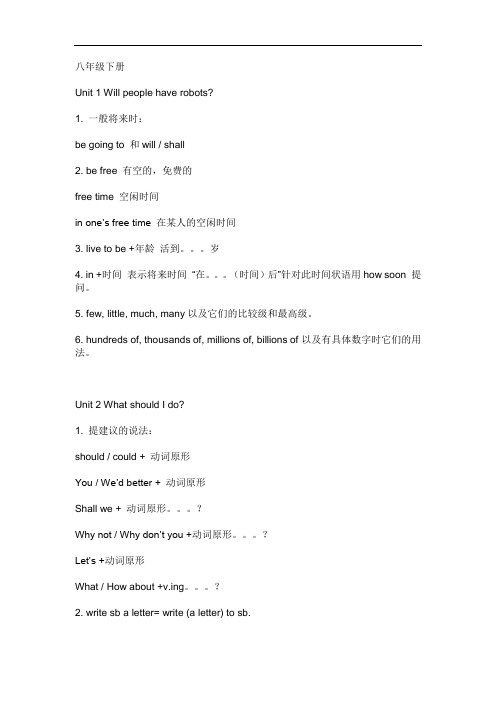
八年级下册Unit 1 Will people have robots?1. 一般将来时:be going to 和will / shall2. be free 有空的,免费的free time 空闲时间in one’s free time 在某人的空闲时间3. live to be +年龄活到。
岁4. in +时间表示将来时间“在。
(时间)后”针对此时间状语用how soon 提问。
5. few, little, much, many以及它们的比较级和最高级。
6. hundreds of, thousands of, millions of, billions of以及有具体数字时它们的用法。
Unit 2 What should I do?1. 提建议的说法:should / could + 动词原形You / We’d better + 动词原形Shall we + 动词原形。
?Why not / Why don’t you +动词原形。
?Let’s +动词原形What / How about +v.ing。
?2. write sb a letter= write (a letter) to sb.3. call sb up= call sb= ring sb= ring sb up=give a call to sb= phone sb=talk with sb on the phone 给某人打电话4. a ticket to a ball game 一张球赛的票the key to the door 门的钥匙the answer to the question 问题的答案the solution to the problem 问题的解决方法5. spend, pay, cost, take 表示“花费”的用法Sb spends money / time on sth.某人在某物方面花费钱/ 时间Sb. pays (money) for sth 某人为某物支付(钱)Sth costs sb some money 某物花某人多少钱It takes sb time/ money to do sth 做某事花某人时间/ 钱6. borrow sth from sb 向某人借某物lend sth to sb=lend sb sth 把某物借给某人7. buy sth for sb= buy sb sth 买某物给某人8. everyone else 别的每个人What else…? 。
人教版新目标英语八年级下册知识点全归纳

Unit 1Will people have robots?II. Grammar:·一般将来时·there will be ·few,a few,little,a little,much,many语法小结:一、一般将来时1.用be doing表示将来:主要意义是表示按计划、安排即将发生的动作,常用于位置转移的动词。
如:go,come,leave,arrive等,也可用于其他动作动词。
We are having fish for dinner.We are moving to a different hotel the day after tomorrow.这种用法通常带有表示将来的时间状语,如果不带时间状语,则根据上下文可表示最近即将发生的动作。
A: Where are you going? B: I am going for a walk. Are you coming with me?A: Yes,I am just coming. Wait for me.2.用be going to do表示将来:主要意义,一是表示―意图‖,即打算在最近的将来或将来进行某事。
Are you going to post that letter?How long is he going to stay here?I am going to book a ticket.另一意义是表示―预见‖,即现在已有迹象表明将要发生或即将发生某种情况。
It’s going to rain.George is putting on weight; he is going to be quite fat.3. 用will/ shall do表示将来:主要意义,一是表示预见。
You will feel better after taking this medicine.Do you think it will rain?二是表示意图.I will not lend the book to you.Take it easy,I will not do it any longer.基本结构:She will come to have class tomorrow.Will she come to have class tomorrow?She won’t come to have class tomorrow.What will she do tomorrow?二、There be结构1. there be结构中的be是可以运用各种时态的。
新目标八年级下英语语法综合复习
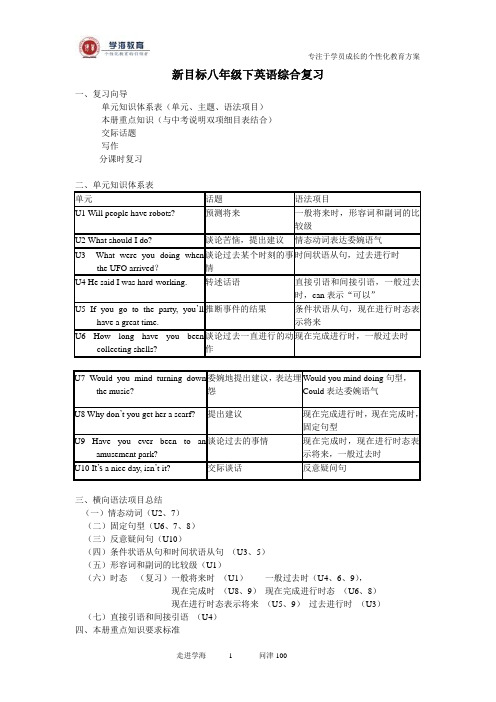
新目标八年级下英语综合复习
一、复习向导
单元知识体系表(单元、主题、语法项目)
本册重点知识(与中考说明双项细目表结合)
交际话题
写作
分课时复习
二、单元知识体系表
三、横向语法项目总结
(一)情态动词(U2、7)
(二)固定句型(U6、7、8)
(三)反意疑问句(U10)
(四)条件状语从句和时间状语从句(U3、5)
(五)形容词和副词的比较级(U1)
(六)时态(复习)一般将来时(U1)一般过去时(U4、6、9),
现在完成时(U8、9)现在完成进行时态(U6、8)
现在进行时态表示将来(U5、9)过去进行时(U3)(七)直接引语和间接引语(U4)
四、本册重点知识要求标准
1. 情态动词(may\might, will\would)
2. 直接引语和间接引语
3. 时态(一般将来时,一般过去时,过去进行时,现在完成时,现在完成进行时,现在进
行时态表示将来)
4. 反意疑问句
5. 交际话题
谈论苦恼,提出建议(U2)
谈论过去一直进行的动作(U6)
委婉地表达埋怨(U7)
提出建议(U8)
五、写作话题
个人,周围环境,预测将来
六、写作方式
1、描述人物、活动或事件
2、表达观点、情感和态度
七、分课时复习
1、头脑风暴(单元-词汇-词组-句型)
2、语法详解及简单练习
3、巩固练习(卷子形式)。
- 1、下载文档前请自行甄别文档内容的完整性,平台不提供额外的编辑、内容补充、找答案等附加服务。
- 2、"仅部分预览"的文档,不可在线预览部分如存在完整性等问题,可反馈申请退款(可完整预览的文档不适用该条件!)。
- 3、如文档侵犯您的权益,请联系客服反馈,我们会尽快为您处理(人工客服工作时间:9:00-18:30)。
新目标英语八年级(初二)下册预习(复习)资料◆unit 1 Will people have robots?知识点:1.形容词,副词的比较等级考查热点透视:a)表示A与B在程度上相同时,“as+形容词或副词的原级+as”结构。
表示A不如B时,可用“not as/so+形容词或副词的原级+as”结构。
b)表示A比B在程度上“更,..”时,可用“形容词或副词的比较级+than”结构c)表示三者或三者以上的比较,其中一个在程度上“最,..”时,常用“the+形容词或副词的最高级”结构,后面可带“of/in的短语”来说明比较的范围。
(注意:副词的最高级在句中常省略“the”.)d)在形容词或副词的比较级前,可以用“ a little, even, far, much,still”的等词语来修饰,以加强语气。
e)表示“越来越,.”时,常用“形容词或副词的比较级+and+形容词或副词的比较级”结构,但要注意,对于多音节和部分双音节形容词,副词而言,若要表达此意时,要用“more and more+形容词或副词的原级“结构。
f)在表示“其中最,.之一“的含义时,常使用“one of+the+形容词最高级形式+名词复数”结构,其中的定冠词the不可以省略。
g)如果强调“两者中比较,的(一个)”的意思时,可使用“the+形容词比较级+其它”结构。
h)表示“越,.越,.”, 可使用“the+形容词或副词的比较级,the+形容词或副词的比较级”结构。
2 .一般将来时a)一般将来时的构成:由助动词shall或will加动词原形构成,shall用于第一人称。
在口语中,will在名词或代词后常简略为’ll, will not常简略为won’t。
这个时态的肯定,否定和疑问结构可表示如下:肯定句否定句疑问句I (We)shall(will) go. You(He, She, They)will go. I(We)shall(will) notgo.You(He, She,They)will not go.Shall I(we) go?Will you (he, she,they) go?用”be going to +动词原形”也可表示将来时,表示将要发生的事,打算或决定要做的事。
b)一般将来时的用法:1)表示将要发生的动作或情况;2)不以人的意志为转移,肯定要发生的事情。
The day after tomorrow will be National Day.后天是国庆日。
3. in/after:in是指以现在时间为起点的“在一段时间以后”。
也可以表示“在将来多少时间之内”,句子中的谓语动词要用一般将来时态;after常指以过去时间为起点的“一段时间之后”,所以它与过去时态连用。
当after 指某个特定的未来时刻或日期之后,或指以将来某一时间为起点的若干时间之后时,它可以与将来时态连用。
4.more, less, fewer的用法区别:more为many, much的比较级,意为“更多”,可修饰可数与不可数名词。
Less 是little的比较级,意为“更好,较少”,修饰不可数名词。
Fewer是few的比较级,意为“更少”,修饰可数名词复数。
【注意】few, little表示否定“几乎没有”。
a few, a little表示肯定“一点,几个”。
5.would like sth意思为“想要某物“; would like to do意思为”想要做某事“。
回答would like句型的一般疑问句时,其肯定回答为“Yes, please.”;否定回答“No, thanks”或“I’d like /love to, but,.”6. Such作形容词,意思是“如此的”“这样的”,修饰各种名词。
Such这样的。
如It is such bad weather.天气如此恶劣。
Such常和as搭配,表示一种类别。
如We enjoy such a voice as hers.我们喜欢象她那样的嗓子。
Such常和表示结果的that从句搭配,表示“如此,.以至于,”如It was such a hot day that we all had to stay at home.Such,that,和so,that,都可用来引出一个结果状语从句。
由于such是形容词,所以that从句前有一个受such修饰的名词;而so 是副词,用以修饰形容词或副词,因此that从句前一般不出现名词。
如They are such kind-hearted teachers that people in the village all respect them.The exam was so difficult that many students failed to pass it.a)如果名词是可数名词的单数形式,such和so的位置不同:such+a/an+形容词+单数名词so+形容词+a/an+单数名词b)如果名词是不可数名词或名词复数,只可用such,不能用so.:such+形容词+不可数名词或复数名词c)如果被修饰的不可数名词被much, little, 或复数名词被many, few等表示量的形容词修饰时,用so,不用such.d)当little表示“年纪小的”时,可用such+little+名词。
7.be able to 为“能,会”,表示能力,在这个意义上与can的意思相同,一般情况下两者可以互换,但can 只有现在式和过去式(could)而be able to则用于更多的时态,主要体现在be的变化。
两者在用法上有一些差异:can (could)表示主观能力不表示意愿,它的将来时用will be able to而 be able to表示主观意愿强调克服困难做某事。
◆unit 2 What should I do?知识点:1..loud是形容词,loud-louder-loudest意思是“响亮的”;作副词时,常与talk, sing, laugh 等词连用,如speak loud; loudly “大声地”带有喧闹的意味,常用来修饰shout, cry, call, knock等动词,通常没有比较级和最高级,作状语;aloud 副词,出声地,大声地,仅指发出声音(以使能被听得见)。
2.Enough为形容词,意思是“足够的”;enough +n.修饰名词enough money; adj/adv+enough修饰形容词或副词;enough to do 足够做某事3.present, gift礼物:gift带有一定的感情色彩,通常指昂贵的“礼物”,强调送礼人的诚意,有时有“捐赠”之意,多用于正式场合;present指为表达情谊,敬意或出于礼节,在某特定时刻或场合赠送的“礼物”,此礼物价值不一定高。
make sb a present of把,作为礼物送给4.borrow, lend: borrow“借入,借给”即说话人向他人借东西borrow sth from sb.; lend-lent-lent“借出,借给”即说话人把自己的东西借给他人lend sb sth= lend sth to sb5 except,besides除,之外: except除了,都,besides强调“除了,之外还有,”在no one, nobody, nothing 等词后加介词but也表示“除了”。
6.find out, find, look for: find out“找出,发现,查明”多指通过调查,询问,打听,研究之后搞清楚,弄明白或指找出较难找到的,无形的抽象的东西;find“找到,发现”通常指找到或发现有形的东西也可指偶然发现某物的某种情况,强调找的结果;look for“寻找”强调动作。
7.talk about谈到,谈论;talk of谈到,说到;have a talk with与..谈谈,做报告;talk to sb对,谈话;talk with sb与,交谈;talk to sb和talk with sb 均表示“和某人谈话”,“讲话”。
talk to sb比较常用,侧重一方谈,一方听;talk with sb侧重双方交谈;talk about sb则表示“谈论某人”8.miss 和lose:miss意思为“发现丢失”“觉得不在”;lose意思为“丢失”“失去”。
在本质上,miss是一种主观感觉,而lose是一种客观结果。
9.be used to doing习惯于做某事;used to do过去常常,暗含与现在明显的不同,只用于过去时;be used to do是use的被动语态,意思是,.被用来做某事。
10.own 与 have: own强调的是拥有,占有某物为自己的财产,但所占有的东西目前不一定是由人使用,强调所有权;have为普通动词,表示的所有关系。
own +n. egWho o wns the dog? ;own +宾语+宾补 eg. He owns himself wrong.;own+从句eg. He owns that he is wrong. ;of one’s own完全属于某人自己的;on one’s own独立地,自愿地;with one’s own ears亲耳11. attend, join, take part in: attend“出席,参加,上学”attend school 上学,attend meeting出席会议;take part in 参加,是指参与某项活动 take an active part in积极参加;join 参加,当join用于加入某个团体或组织,成为其中的一员,后面直接跟名词,当join表示参加某项活动时后面跟介词in .◆unit 3 What were you doing when the UFO arrived?知识点:1.过去进行时a)过去进行时由“was/were+动词ing形式”构成。
以动词work为列,其肯定式,否定式,疑问式以及简略答语见下表:肯定式:I/He/She/It was working. We/You/ They were working.否定式:I/He/She/It was not working. We/You/They were not working.疑问式和简略答语:Was I working? Yes, you were.Was he working? No, he wasn’t.【注意】was not常简略为wasn’t; were not常简略为weren’tb)过去进行时的用法:过去进行时表示过去某一时刻或某一段时间正在进行的动作。
